Premium Only Content
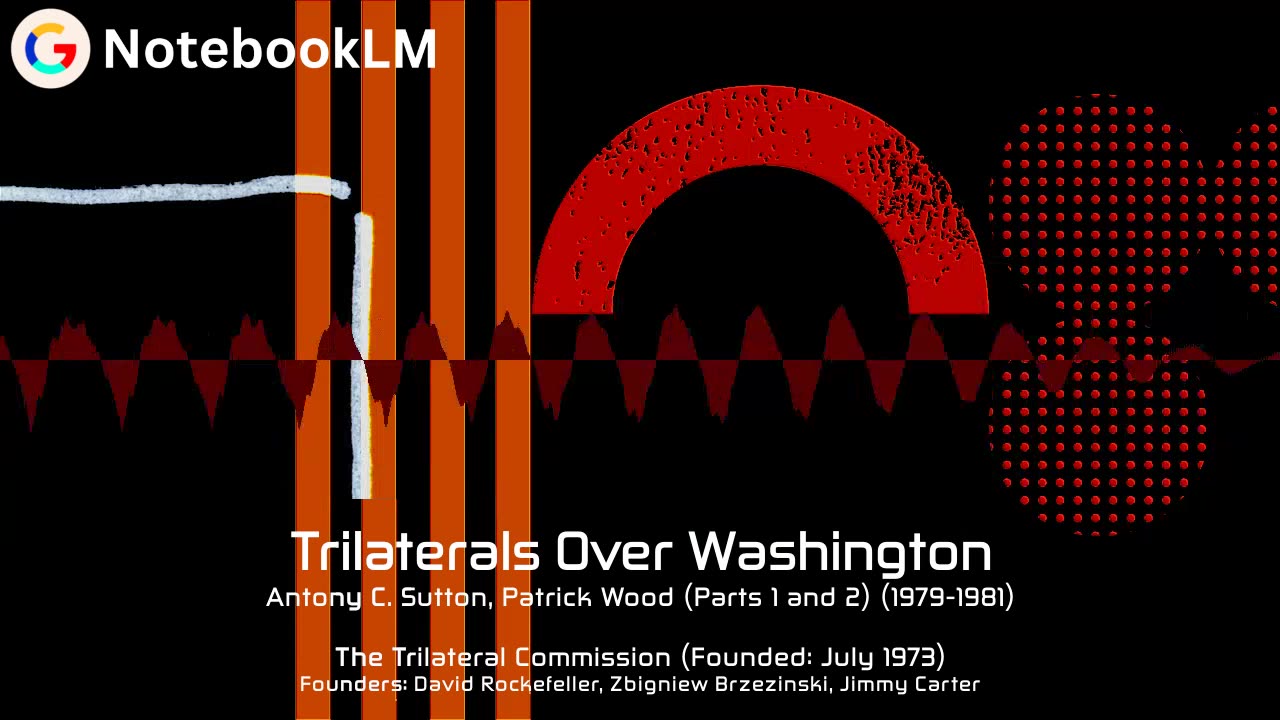
Book: Trilaterals Over Washington - Sutton & Wood - Trilateral Commission Discussion - NotebookLM
Trilaterals Over Washington (Parts 1 and 2) (1979-1981) - Antony C. Sutton, Patrick Wood
https://modulate.us.to/jsonurl/index.php?alias=book3
The Trilateral Commission is a nongovernmental international organization aimed at fostering closer cooperation between Japan, Western Europe and North America.
Founders: David Rockefeller, Zbigniew Brzezinski, Jimmy Carter
Founded: July 1973
Who are the main financial backers of the Aspen Institute?
The main financial backers of the Aspen Institute, as discussed in the source document, are:
● Atlantic Richfield Company and Foundation: The source notes Atlantic Richfield (ARCO) as one of the leading foundations contributing to the Aspen Institute, with donations in 1979 totaling $1,186,250 for various programs. The largest single institutional shareholder in ARCO is Chase Manhattan, with the largest individual shareholder being Robert O. Anderson, who also served on the board of directors of Chase Manhattan Bank.
● Rockefeller Family and Foundation: The source identifies the Rockefeller Foundation as another leading financial contributor to the Aspen Institute. In 1979, the Rockefeller Foundation's donations to the Aspen Institute totaled $343,000. David Rockefeller, chairman of Chase Manhattan Bank, is mentioned as a key figure in the Aspen Institute's funding network.
● Markle Foundation: The Markle Foundation is listed as a "substantial" backer of the Aspen Institute. The foundation's chairman, Charles F. Biddle, is linked to the Morgan Guaranty banking group, highlighting connections between the Aspen Institute and New York financial interests.
● Kettering Foundation: The Charles F. Kettering Foundation is mentioned as a funder of the Aspen Institute. The source highlights the overlap in funding between the Aspen Institute and the Trilateral Commission, noting that the Kettering Foundation was also a key backer of the Trilateral Commission.
● Ford Foundation: Although not mentioned as a leading contributor, the Ford Foundation is listed as a donor to the Aspen Institute. Similar to the Kettering Foundation, the Ford Foundation's support of both the Aspen Institute and the Trilateral Commission is pointed out.
● National Endowment for the Humanities (NEH): The source reveals that a significant portion of the Aspen Institute's funding, almost 40%, comes from the National Endowment for the Humanities (NEH).
In 1979, the NEH provided $1,010,000 to the Aspen Institute. The source emphasizes the use of taxpayer money, through the NEH, to support the Aspen Institute.
The source repeatedly emphasizes the interconnected nature of the Aspen Institute's funding, highlighting the role of private foundations, corporations, and even public funds in supporting the organization. The source also draws attention to the overlapping funding sources of the Aspen Institute and the Trilateral Commission, implying a connection between the two organizations and their goals.
What is the Trilateral Commission's main objective in terms of global governance?
The Trilateral Commission and its Goal of a New World Order:
The Trilateral Commission's main objective, according to the sources, is to establish a New World Order through a process of gradual economic integration and political cooperation, primarily among North America, Western Europe, and Japan. This "Trilateral process," as the sources call it, aims to manage global interdependence and address international challenges through coordinated policies and actions.
Here are some key aspects of the Trilateral Commission's objectives in terms of global governance, as gleaned from the sources:
● Regional Economic Groupings: The sources indicate that the Trilateral Commission seeks to establish a new world order by first creating regional economic groupings. These groupings, once formed, would then be linked to form a global economic power structure. This approach differs from previous attempts at global governance, such as the League of Nations or the United Nations, which focused on uniting nations under a single political entity.
● Managing Interdependence: The Trilateral Commission believes that the growing interconnectedness of nations, or "interdependence," necessitates a coordinated approach to global governance. They argue that the management of interdependence is crucial for maintaining world order in the coming years.
● Coordination, Not Conspiracy: While the sources acknowledge that the Trilateral Commission's methods involve secrecy and elitism, they primarily present the Commission's approach as one of coordination rather than outright conspiracy.
The sources emphasize that the Trilateral Commission aims to achieve its goals through policy recommendations, dialogue among influential individuals, and gradual shifts in the global economic and political landscape.
● Shifting Power from National Governments to International Bodies: The Trilateral Commission seeks to establish international organizations, like a strengthened IMF, with greater control over national economies and policies. This would involve transferring some decision-making power from national governments to these international entities.
The sources offer a critical perspective on the Trilateral Commission's goals and methods, suggesting that they primarily serve the interests of the Commission's members, who are primarily composed of individuals from international banks, multinational corporations, and influential policy circles.
It is important to note that the sources primarily present the views of the authors, Antony C. Sutton and Patrick Wood, who are critical of the Trilateral Commission and its objectives. They see the organization as a vehicle for elite interests to gain global control and erode national sovereignty.
How does the Trilateral Commission view the role of the media in achieving its goals?
The Trilateral Commission and the Media: A Threat or a Tool?
The sources highlight a complex and rather contradictory view of the media's role in the Trilateral Commission's pursuit of a New World Order. The sources portray the media as both a potential obstacle to the Trilateral Commission's goals and a powerful tool for shaping public opinion.
On one hand, the sources, particularly through the views of Sutton and Wood, suggest that the Trilateral Commission sees a free and independent media as a threat to its ambitions. This is evident in the analysis of "The Crisis of Democracy," a book written by Trilateral Commission members.
● "The Crisis of Democracy" and Media Control: The sources cite "The Crisis of Democracy" to illustrate the Trilateral Commission's concerns about an overly critical and independent media. The book argues that the media's focus on exposing societal problems and criticizing government actions undermines the authority needed for effective governance and hinders the implementation of necessary changes, such as those proposed by the Trilateral Commission.
● Desire for a "Responsible" Press: The sources reveal that the Trilateral Commission favors a "responsible" press, which, in their view, implies a media more receptive to the perspectives and agendas of those in power, particularly those within the Trilateral Commission.
On the other hand, the sources also acknowledge the Trilateral Commission's recognition of the media's power and influence. This is evident in the Commission's efforts to shape media narratives and influence key individuals within media organizations.
● Media Representation within the Trilateral Commission: The sources point to the presence of prominent media figures within the Trilateral Commission as evidence of their attempts to exert influence over media narratives.
While acknowledging the limited number of media representatives, the sources stress their high level of influence, mentioning individuals like Hedley Donovan, editor-in-chief of Time, and Emmett Dedmon, editorial director of the Chicago Sun-Times.
● Corporate Influence on Media Content: The sources reveal that the Trilateral Commission's influence on the media extends beyond direct membership. Sutton and Wood highlight the role of Trilateral Commission members who hold directorships in major media corporations, such as CBS, Time Inc., and the New York Times.
This connection, they suggest, provides a mechanism for the Trilateral Commission to indirectly influence media content and suppress unfavorable coverage.
● Informal Censorship and the Case of C. Gordon Tether: The sources cite the case of C. Gordon Tether, a Financial Times columnist, as an example of the Trilateral Commission's attempts to suppress critical reporting. The sources describe how Tether's articles, often critical of international bankers and the European Economic Community, were censored and eventually led to his dismissal by M.H. Fisher, a Trilateral Commission member and managing editor of the Financial Times.
The sources' portrayal of the Trilateral Commission's view of the media underscores the organization's strategic approach to achieving its goals. While recognizing the potential threat posed by a free and critical press, the Trilateral Commission also understands the importance of shaping media narratives and leveraging media influence to garner public support for its agenda.
How does the Trilateral Commission propose to “restore an appropriate balance” between the press, the government, and
other institutions in society?
Restoring the "Appropriate Balance": The Trilateral Commission's Approach to the Media
The Trilateral Commission, according to the sources, sees an overly critical and independent press as a stumbling block to achieving its objectives. They believe a more "balanced" relationship between the media, government, and other powerful institutions is needed to effectively govern in an increasingly complex world. While the sources do not explicitly detail a step-by-step plan to achieve this "balance," they do offer insights into the Trilateral
Commission's approach, which includes both direct and indirect methods of influencing media narratives and controlling information flow.
Direct Methods:
● Regulation: The sources, referencing "The Crisis of Democracy," indicate the Trilateral Commission's preference for regulating the media similar to how industries are regulated. They draw a parallel between the need to control monopolies in the business world and the perceived need to rein in the media's power, going as far as suggesting a regulatory body similar to the Interstate Commerce Commission to oversee media operations. This approach, they argue, would help restore a more "appropriate balance" by ensuring the media acts responsibly and doesn't unduly hinder the government's ability to govern.
● Representation and Influence: The sources highlight the Trilateral Commission's strategic placement of prominent media figures within its ranks. By including individuals in positions of editorial authority, the Commission gains a foothold in shaping media narratives and promoting its worldview. This direct representation, the sources imply, provides the Commission with an internal mechanism to influence coverage and potentially suppress dissenting voices.
Indirect Methods:
● Corporate Influence: The sources reveal a deeper layer of influence stemming from the Trilateral Commission's ties to major corporations, many of which have media holdings or significant advertising budgets. By controlling the purse strings, these corporations, often with Trilateral Commission members on their boards, can exert pressure on media outlets to conform to specific narratives. The sources suggest that this indirect leverage allows the Commission to shape media content, limit exposure of unfavorable information, and promote a worldview aligned with their objectives.
● Informal Censorship: The sources cite the case of C. Gordon Tether as a stark example of the Trilateral Commission's willingness to resort to informal censorship to silence critical voices. Tether, a seasoned journalist for the Financial Times, faced pushback for his columns critical of international bankers and the European Economic Community. His eventual dismissal by M.H. Fisher, a Trilateral Commission member, illustrates the organization's readiness to use its influence to suppress critical reporting, even if it means resorting to methods that run counter to the principles of a free press.
● "Structuring" Information Flow: The sources point to the Trilateral Commission's awareness of their role as "gatekeepers" of information. They acknowledge that the Commission recognizes its ability to influence public discourse by controlling the narratives that reach the masses. The sources argue that the Trilateral Commission, by influencing media narratives, can shape public perception and build support for their agenda while minimizing dissent
or alternative viewpoints.
The sources present a picture of the Trilateral Commission as a body deeply concerned with controlling the information landscape. They see a free and independent media as a potential obstacle and advocate for a more "balanced" relationship, one where the media is more aligned with the government and other powerful institutions.
While the sources don't offer a concrete roadmap, they do illustrate the Trilateral Commission's willingness to use a combination of direct and indirect methods, including regulation, strategic representation, corporate pressure, informal censorship, and control of information flow, to achieve its desired level of control over the media and public discourse.
How do the authors of "Trilaterals Over Washington" respond to criticism that they are promoting a "conspiracy" theory?
Responding to "Conspiracy Theory" Accusations
The authors of "Trilaterals Over Washington" directly address the accusations of promoting a "conspiracy theory," pushing back against this label and emphasizing their focus on verifiable information and open criticism.
● Rejecting the "Conspiracy" Label: The authors, particularly in Chapter 10 of Part 2, explicitly state that they do not subscribe to a "conspiracy theory" when analyzing the Trilateral Commission. They define a conspiracy as a "secret agreement to do something legal or illegal" and argue that the Trilateral Commission, while often operating in secrecy, is not a hidden organization. They point to their own ability to obtain information about the Commission's activities and publications as evidence of its openness to scrutiny.
● Focus on Open Criticism and Public Discourse: The authors emphasize their commitment to engaging in open and public criticism of the Trilateral Commission. They highlight their participation in public debates with Trilateral Commission members, citing appearances on national radio programs and at speaking events alongside Commission representatives. They argue that this willingness to engage in open dialogue demonstrates their commitment to fair criticism and counters the accusations of promoting secretive or conspiratorial narratives.
● Highlighting Public Opposition to Trilateralism: The authors assert that public sentiment towards the Trilateral Commission is overwhelmingly negative. They cite their experiences in public forums, where they claim that audience responses, whether through call-in radio shows, live events, or measured feedback mechanisms, consistently reveal a strong aversion to the Commission and its goals. This public disapproval, they argue, further supports their position that criticism of the Trilateral Commission is not limited to fringe groups or conspiracy theorists, but rather reflects a broader societal concern.
● Emphasis on Facts and Verifiable Information: The authors underscore their reliance on factual information and documented evidence when presenting their critiques of the Trilateral Commission. They point to their use of publicly available sources, including the Commission's own publications, government records, and media reports, to support their arguments. They argue that this commitment to verifiable information distinguishes their work from baseless conspiracy theories, which often rely on speculation, conjecture, and unverified claims.
● Challenging the Commission's Responses to Criticism: The authors criticize the Trilateral Commission's tendency to dismiss their critics as extremists or fringe elements. They cite instances where the Commission has used dismissive labels, such as "right-wing radicals" or "Marxists," to discredit their work without addressing the substance of their arguments.
They argue that this tactic reflects the Commission's aversion to legitimate criticism and its efforts to silence dissent by painting their critics as unreasonable or radical.
The authors' response to accusations of promoting a "conspiracy theory" highlights their efforts to position their critique within the bounds of responsible and verifiable analysis. They distance themselves from sensationalist claims, emphasizing their reliance on documented evidence and their willingness to engage in open debate.
They challenge the Trilateral Commission's attempts to silence dissent through dismissive labeling, presenting themselves as advocates for transparency and open discourse in the face of what they perceive as a threat to national sovereignty and democratic principles.
-
 2:15:39
2:15:39
Rebel News
4 hours ago $10.47 earnedRebel Roundup | Freeland and Fraser out, Fall Economic Statement delayed (again): Ezra Levant reacts
43.9K32 -
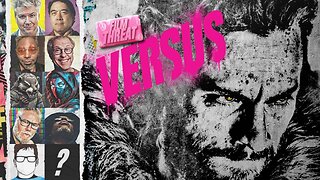 LIVE
LIVE
Film Threat
6 hours agoVERSUS: KRAVEN THE HUNTER + LORD OF THE RINGS: THE WAR OF ROHIRRIM | Film Threat Versus
120 watching -
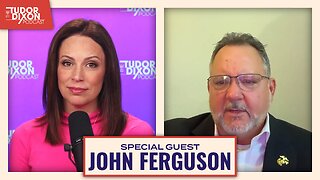 44:42
44:42
Tudor Dixon
2 hours agoBREAKING: The Truth About the Drones Invading America | The Tudor Dixon Podcast
2631 -
 1:47:05
1:47:05
The Quartering
3 hours agoHuge Drone Update, Kamala To Run Again, CNN Commits Treason & Trump Trolls On Drones
71.6K40 -
 2:21:16
2:21:16
Nerdrotic
5 hours ago $5.62 earnedThe Last Jedi Still SUCKS | Superman Returns | An FNT Square Up - Nerdrotic Nooner 451
71.3K5 -
 LIVE
LIVE
StoneMountain64
3 hours agoHIGH TIER raids while on missions
215 watching -
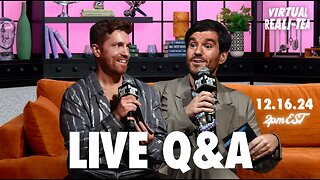 25:58
25:58
Page Six
5 days agoLIVE: Danny & Evan talk hot reality TV takes, Bravo news & answer fan questions! | Virtual Reali-tea
26.8K1 -
 1:22:35
1:22:35
Russell Brand
4 hours agoScience, Faith, and Totalitarianism: A Conversation with Dr. John Campbell- SF514
114K110 -
 LIVE
LIVE
hambinooo
6 hours agoTHE PUBG GOAT
239 watching -
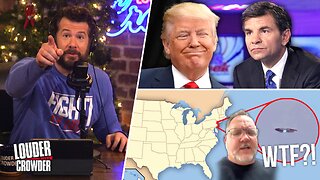 2:08:23
2:08:23
Steven Crowder
7 hours agoDrone Conspiracy: Is the Government Hiding Something Huge From the American Public?
499K295